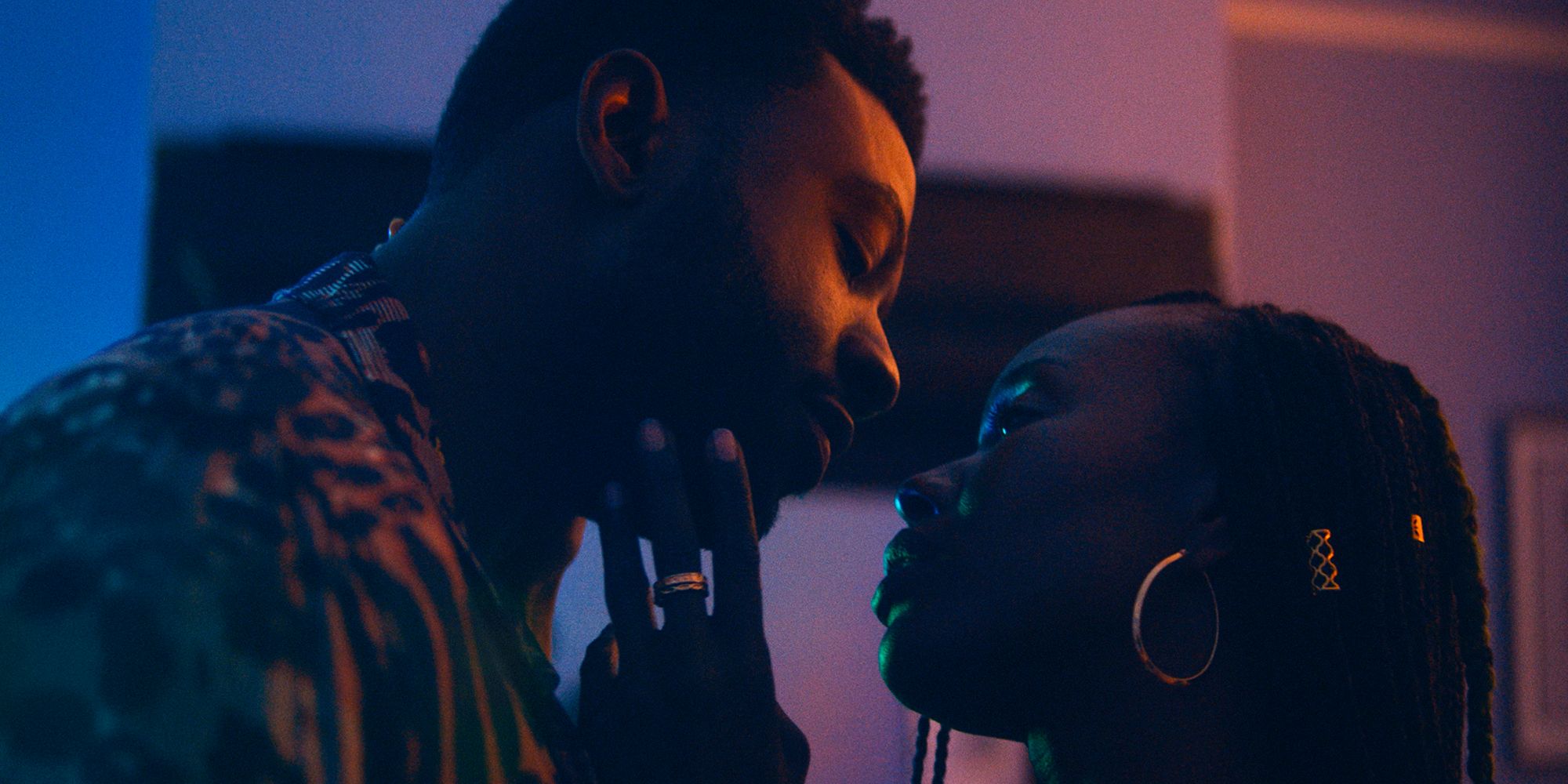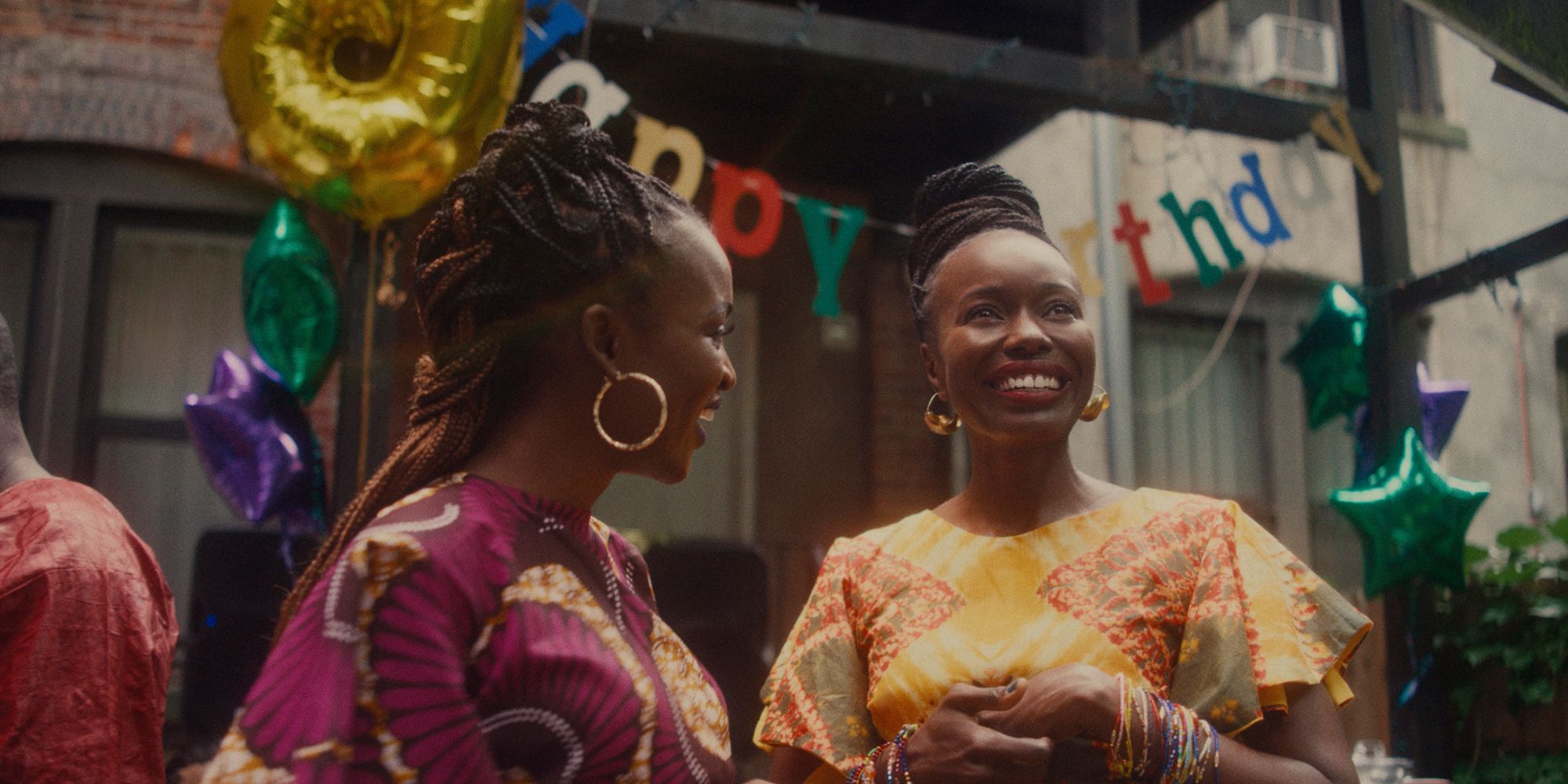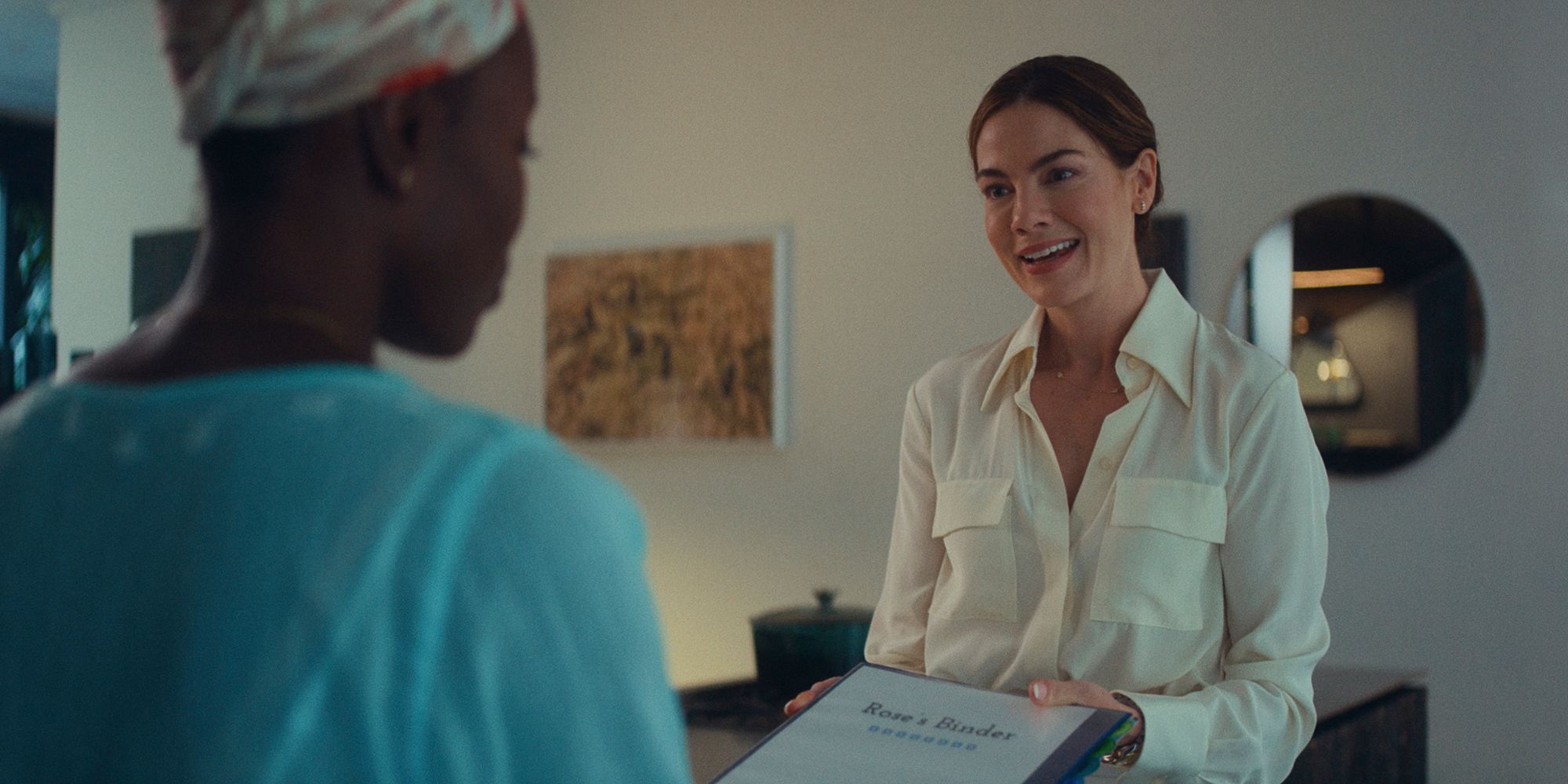Nanny marks writer-director Nikyatu Jusu's feature directorial debut, but no one would know it from the beautifully crafted narrative she weaves. At once a character study of its lead character Aisha (played by Titans star Anna Diop) and a takedown of the so-called American dream, the psychological thriller even leaves room for folk horror in the introduction of West African spirituality that follows Aisha against her will. The film has already received accolades at Sundance and TIFF, with a limited theatrical release coming on November 23 before it streams on Prime Video beginning December 16.
Diop is joined by Sinqua Walls (White Men Can't Jump) and Michelle Monaghan (True Detective), who each play a vital role in shaping Aisha's experience as a Senegalese immigrant in America. While Walls' Malik lends a comforting hand and keeps the darkness at bay, Monaghan's Amy can barely contain her disdain for the woman practically raising her daughter Rose. Meanwhile, Aisha longs for her son Lamine while fighting against supernatural forces that are forcing their way into her reality.
Screen Rant spoke to stars Anna Diop, Sinqua Walls, and Michelle Monaghan about how they stepped into their roles and explored the themes of Nanny. Filmmaker Nikyatu Jusu also shared her casting process, the road to Blumhouse distribution, and how certain moments came together in the editing room.
Cast & Director Talk Nanny
Screen Rant: Nikyatu, I loved what you said Nanny being about Aisha's perspective rather than being responsible for more. That means the casting for her was incredibly important, and Anna kills it. Why was she the right choice and what was that casting process like for you?
Nikyatu Jusu: This is an easy question. I had been tracking Anna for a while, since she started Titans. I didn't know about her range, all I knew was she looked like Aisha, and she possessed this gracefulness and poise that I was looking for; this strength. When she auditioned, and she nailed it, the deal was sealed. I was really excited that she knocked it out of the park.
We had an amazing casting director that brought her to us, and Anna's humble enough to go through the process. I was really thankful for that.
Anna, I know you intentionally didn’t investigate West African religion and spirituality much to align with Aisha herself. But you worked very hard on the accent and on her background, which certainly comes through. Did working on Nanny make you feel closer to your Senegalese roots?
Anna Diop: I felt like it brought me closer to the women, including my own mother, that were domestic workers. And it brought me closer to understanding what it's like for them to be in these spaces and navigate these spaces, so it further grew my empathy for these women. Yeah, I would say that's what it brought me closer to.
Michelle, Amy is something of an antagonist in Aisha's life, but she's doing her best in her own mind. Can you talk about how she views Aisha's place in her life and household, and the conflict between them?
Michelle Monaghan: Yeah, one of the aspects that Nikyatu and I spoke about in-depth was the intersection of womanhood and motherhood in a patriarchal society. That was something that I'd never even honestly considered, or thought of. This is one of the many reasons I love Nikyatu, and why I think her writing and her voice is so critical right now. She's tackling these nuanced societal norms, and she's forcing us to look at things from a different perspective.
I thought that was really fascinating, and it made Aisha and Amy's relationship much more dynamic, because clearly, you have two women who depend and need each other. Obviously, one's sacrifices are much greater than the other's, but it provides a unique lens for us to consider as an audience. And I thought that was really important and really astute of Nikyatu to point out.
As we're watching Aisha's struggles and the societal problems that her story is exposing, Malik really provides some of the more lighthearted moments in the film, and he really is the light in her life. What do you think he sees in her, and how did you approach that relationship, Sinqua?
Sinqua Walls: I think Malik sees a kindred understanding. A lot of the dialogue that exists in life today happens in the subtext; in the nonverbal. That's why, when we meet these two characters on their journey together, we see there's nonverbal communication first. That says so much. There's almost this effect where, as I always say, "The light in me sees the light in you." I think they have that instantly, and that's the connection that drives them through the story.
How does having Blumhouse as a distributor help expand the scope of the film?
Nikyatu Jusu: We were one of films that went into Sundance not having distribution, so although getting in felt like a win, we did not expect to really win. While we still were navigating not having distribution, there were films that weren't even in competition that already had distribution, so we had that added stress. The stakes were a little higher for our film.
But Jason Blum scooping up this film? I think it was brave of him, because he has a body of work that is very different from Nanny, and Nanny itself is different from his canon. It just speaks to the team that he has around him. There are a lot of powerful women around Jason Blum, including his wife, who just raved about the film when I met her. I was really excited to be in business with him, because he's an innovator in terms of seeing new talent and ushering new voices into horror.
Much of Aisha’s pain stems from having to raise someone else's child when her own is so far away. Anna, can you talk about how Rose and Lamine play off each other in her mind and what that was like for you?
Anna Diop: This was one of the themes I thought about when I was prepping for the role. Some thoughts that came to mind were, "Is there a resentment in Aisha at moments?" Because she's here taking care of this child while her own is so far away.
I constantly played with that throughout filming, and I tried to offer Nikyatu different variations of what I was doing and how I was relating to Rose. She edited it all so beautifully, and what I think shows up onscreen is something nuanced and very honest. It's what a mother who desperately misses her child and is contending with a lot of guilt is feeling while essentially forced to look after other people's children. Yeah, I just tried to play with that a lot throughout filming.
Michelle, you mentioned the patriarchy being one of the themes in the story, and the relationship between Amy and her husband is very interesting on that front. How does the imbalance of income in their household and Amy's struggles in the workplace play into their dynamic?
Michelle Monaghan: That's an interesting question. What you're experiencing is the only thing what you know, and she's got this unique relationship with her husband. They're not necessarily happily married, and there's definitely a power dynamic. What do you do with that power dynamic? Sometimes you pay it forward, or you pass it on. What do you do when you're lacking power? How can you take advantage of your position and potentially exercise your privilege over someone else?
I think that's what we see within this dynamic. She lacks power in certain ways, and she essentially takes it out on Aisha. It's something I think we see that all too often in the hierarchy, as I've come now to understand it.
Sinqua, I really loved the scenes with your grandmother, and her being a vehicle through which some of the spirituality is passed down or explained. How much do you think Malik really knows about that side of her, and what did you learn from those scenes?
Sinqua Walls: From all the conversations that I had with Nikyatu in the process, I think he's very well-versed in that world. When people can pretend to see the movie, they'll hear a line where he says, "I just choose not to see that." I think it's a very active choice, but it also is why there is a gravitational understanding of Asia.
He can feel that essence of her going through this, and I think that's also part of the maturation of their relationship, and why it's so imperative that he brings her to meet his grandmother. He can say, "I see what you're going through, and I have an understanding of this trial." He grew up in it, so he definitely understands, but he's actively choosing naivete in certain spaces to have an easier life. And I think it's intentional.
Without spoiling the ending, I will just say there was a level of ambiguity to it that did not make it any less satisfying of a journey. Nikyatu, how did you approach those more surreal elements when telling a narrative that's not entirely straightforward?
Nikyatu Jusu: It's always a constant dance when you have an A story and a B story. The horror elements are the external manifestation of what is happening internally in your protagonist, and it's a dance that starts in the conceptual stage before transitioning into the writing stage and then into the editing stage.
In the edit, we found moments that really spoke to what happens in the scene prior; that speaks to Mami Wata showing up, or what happens in the same prior and after Anansi showing up. They represent different types of resistance, so when Anansi shows up, Aisha has to start acting differently. It was a constant dance in terms of navigating the fantastical with realism.
Anna, I have to say that I love you in Titans too. Is there anything you can tease for Kory's story this season?
Anna Diop: They just released recently that Titus Weaver is playing Lex Luthor, and that was very exciting for all of us. He's fantastic at it. My first scenes filming the new season were with him, which couldn't have been a better way to kick off the season and start filming.
Is there anything else that I can tease? Well, there's some long-awaited romance that people have been desperately seeking. So, I hope that I'll finally stop getting DMs about this. [Laughs]
Sinqua, you are in another very exciting and long-awaited project. Have you found that white men can indeed jump?
Sinqua Walls: I can genuinely say I don't know about all white men, but I know that Jack Harlow can jump. As this process has begun and continued, I tell people that the biggest thing is that he did a lot of his own stunts. There are some jumps in the film that Jack Harlow did indeed do. So, I can't speak for everyone, but I can speak for him. He actually can jump.
Michelle, I loved Echoes, and I would love some more in my life. Is there anything you would like to see if the story gets to continue?
Michelle Monaghan: It's kind of an limited series, so I don't know if there are any plans for it to go on. They certainly left it on a cliffhanger, and I would be curious what kind of story they could dream up for the sisters. But I'd entertain it. I'd definitely entertain it.
About Nanny
In this psychological horror fable of displacement, Aisha (Anna Diop), a woman who recently emigrated from Senegal, is hired to care for the daughter of an affluent couple (Michelle Monaghan and Morgan Spector) living in New York City. Haunted by the absence of the young son she left behind, Aisha hopes her new job will afford her the chance to bring him to the US, but becomes increasingly unsettled by the family’s volatile home life. As his arrival approaches, a violent presence begins to invade both her dreams and her reality, threatening the American dream she is painstakingly piecing together.
Nanny will see a limited theatrical release on November 23 before streaming exclusively on Prime Video starting December 16.




